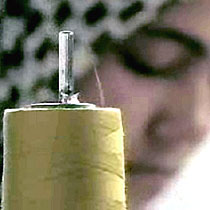2006年VOA标准英语-Anatolia Emerging as Economic Power in Turkey(在线收听)
By Simon Marks
Kayseri, Turkey
29 December 2006
watch Anatolian Tiger report
As the future of Turkey's efforts to join the European Union hangs in the balance, one part of the country in particular is anxiously focused on the relationship between Ankara and Brussels. As Turkey has developed, the region of Anatolia has become an economic powerhouse, doing extensive amounts of business with Western Europe and -- company executives say -- ready to do more. Correspondent Simon Marks visited the city of Kayseri, 500 miles east of Istanbul.
In the plains of Anatolia, "tigers" are on the prowl. For centuries, this part of Turkey has been home to traders and merchants, but never before on a scale like this.
 |
Celal Haznalcaci owns the company. He describes himself as a devout Muslim, but has no problem also being a purveyor of cutting-edge, even sexy fashion. "Of course in our Islamic culture, we're not in the habit of wearing such clothes," he says. "We produce them for business. We understand the demands of our customers, and we produce them accordingly."
Next door to the denim factory, the Boydak Group produces furniture, part of a business empire with an annual turnover of nearly $2 billion. It, too, has large export markets, and so its executives have an ongoing interest in Turkey's openness to the rest of the world. They say they are not concerned by claims that the country's religiously-conservative government is trying to undo Turkey's secular nature.
"These ideas come to mind because the people in our government are religious," says Sukru Boydak, the company's chairman. "But I definitely don't believe that Turkey will move to the right or become more Islamic. Seventy-five percent of Turks don't believe in this. Maybe even 90 percent".
The latest opinion polls bear that out. In November, a respected Istanbul think-tank published research showing that while a greater number of Turks now identify themselves primarily as Muslim, the number wanting to see an Islamic government is going down.
And in Istanbul, where western brand names are now commonplace in the city's stylish neighborhoods, big business is telling the Turkish government to keep the country on its secular track, and continue negotiating membership in the European Union.
Guler Sabanci heads one of the country's largest conglomerates and is arguably the most powerful businesswoman in Turkey today. "We always [say] that Turkey is a bridge, and it is true, Turkey is a bridge," she says. "It's a bridge for energy sources. Turkey is a bridge for cultural sources, for a lot of things. So these are the reasons that I think, when once we look at them together, I think both Europe needs Turkey and I also think Turkey needs Europe."
Back in Kayseri, the Anatolian tigers say they're so confident in their business success that even if Turkey doesn't eventually enter the European Union, they believe they'll continue to make good profits. At the denim factory, the owner said Europeans like to wear fashionable clothes, and the Anatolian Tigers now know how to make them.